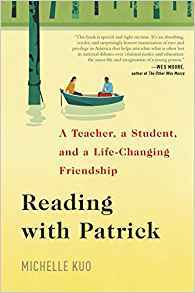 Over the course of the 2017-2018 academic year the branch manager of the O’Neill Library established a Social Justice Book Club. Once a month readers met to discuss a work on a certain topic of social justice -- on women’s rights we read Difficult Women by Roxanne Gay; on indigenous peoples’ rights we read You Don’t Have to Say You Love Me by Sherman Alexie; on environmental issues we read Barbara Kingsolver’s Flight Behavior. And, for trying to make sense of how we come together as a community, we read Tribe by Sebastian Junger. The group took a break for the summer and reconvened in October to discuss Evicted by Matthew Desmond which I have written about here. I really enjoyed the discussion and was saddened to learn it would be our last. Our branch manager announced her upcoming relocation and said the group would be on pause, possibly permanently. Before we left the library that evening though, she offered us a parting gift: the would-have-been Social Justice Book Club read for November: Reading with Patrick by Michelle Kuo. Simply put, it is a memoir of an Asian-American woman’s friendship with one student she met during her work with Teach for America in the Arkansas Delta. But a simple skimming of the “Author’s Note” and “Acknowledgments” section at the back will assure the reader that this is also part history, part sociology, part spiritual journey and part letter to those we love most in life. Kuo walks the reader through complicated issues -- the long-lasting effects of slavery, segregation, poor education, depressed communities, drug use and violence, incarceration and inequitable access to medical care -- and shows how personal relationships and attention to education and writing in particular can lift a soul that otherwise feels hopeless. While working at an alternative school ironically called Stars (now closed) where teachers sent the “bad kids”, Kuo chronicles many false starts in her attempts to reach her students, to motivate them to first, show up for school and then, take it seriously. We rejoice with her when she finally identifies young adult writers who speak to the students personally and urge them to focus, including Jacqueline Woodson -- whose Brown Girl Dreaming we read for the Tipsy Mamas’ Book Club this month. As confidently as Woodson praises teachers from her youth for encouraging her and shaping her into the writer she grew to be, Kuo expresses intense doubt for a teacher’s ability to produce long-lasting change in the lives of her students. Kuo develops a friendship with Patrick Browning in particular, a student who repeatedly needs encouragement to continue to come to school each day. After Kuo completes her work with Teach for America and returns to her alma mater Harvard for law school, Patrick drops out for good, and Kuo blames herself. A recent graduate once more and on her way to a new job in public interest law in California, she detours back to the Delta when she learns Patrick is in jail for killing someone. She visits Patrick frequently in jail, staying nearby for almost the course of a year in order to mentor him. She encourages his education, and she assists in decreasing his sentence from murder to manslaughter. Above all, they read and write together, and he hones his skills as a letter-writer. As a reader, I am grateful for their connection so that I could read his work which reads like poetry and encourages the soul to dream. Go read it, and enjoy the beautiful connection that forms when two very different people are able to teach each other. I felt this culminated in a conversation between them when Patrick, of deep faith, confessed that he didn’t remember what happened on Easter. Kuo, of little faith, had some exposure to Christianity and was able to share the story with him, as well as a humbling experience with a prayer group in her past. She writes: “I told Patrick all this. He was listening, concentrating. He wanted me to believe in God. And he was happy to hear me explain Easter. It meant something to him that I knew the story. And this in turn made the story mean something to me.” (236) Through what other stories could we learn more about each other? The departing branch manager in those last few minutes at that last meeting dictated titles for further reading -- books in different categories -- that she was nearly bursting to discuss. I wrote them down. And I leave them as recommendations to you here. Class Inequality: Heartland by Sarah Smarsh Nickel and Dimed by Barbara Ehrenreich Prison Industry: The New Jim Crow by Michelle Alexander The Sun Does Shine by Anthony Ray Hinton Who does culture and history belong to? The Feather Thief by Kirk Wallace Johnson The Dinosaur Artist by Paige Williams Intersection of race and feminism: Eloquent Rage by Brittney Cooper This Will Be My Undoing by Morgan Jerkins I’m Still Here by Austin Channing Brown Rage Becomes Her by Soraya Chemaly
0 Comments
Leave a Reply. |
Author's Log
Here you will find a catalog of my writing and reflections. Archives
December 2022
|